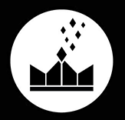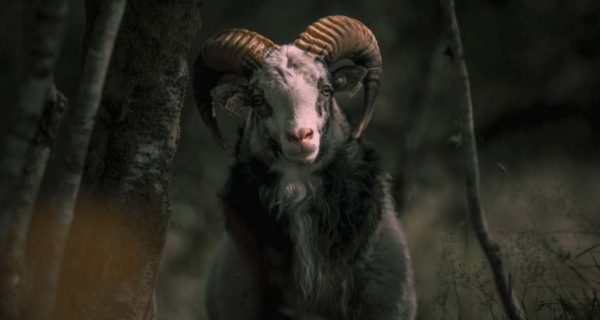I was in a deep, sound sleep, enveloped by soft darkness, when someone shook me by the shoulder.
“Isaac! Wake up, child!”
I heard a voice, my father’s calling me. Reluctantly, I rolled over on my mat and squinted up at his face. Shadows danced across it in the erratic light of his torch. “Father,” I said, stretching under my blanket. “What do you need from me?”
“Get up and dress. We must go to Moriah and offer a holocaust to the Lord. Hurry.”
There was something strange covered up in my father’s tone, I thought, as I shook off the last inviting clutches of sleep and rose. “Yes, Father.”
He left the tent. I rolled up my sleeping mat, folded my blanket and placed it under the mat. I slipped into my white tunic and tied a belt around my waist. Brushing down my mess of curly hair, I walked out of the tent. It was still dark outside, but I could see a faint light beginning to brighten the east. As a cold, unfriendly wind brushed against my bare arms, I shivered and walked up to my father’s side. We glanced over to see Reu and Eber, two of my father’s servants, saddling up the donkey, Nahor. (Father had named the animal Nahor after one of his own brothers. The two evidently shared several marked characteristics.)
The donkey shook its mane and snorted, obviously disgusted at being woken so early in the day. I wanted to laugh, but something in my father’s expression when I looked up at his face made me stop. Still, I reasoned it was just some sort of ache or pain that old people like him suffered every now and then. The servants piled wood for the burning of the holocaust onto Nahor’s back, and I saw my father tuck a gleaming knife into his belt. He gripped the torch with one withered, but still very firm, hand and put the other on my shoulder.
“Come, let us go,” he said to the servants and I. So we began the long journey to the land of Moriah, which would take all of that day and probably some of the next. I was used to these sorts of things; my father was a very devout and pious man, and he expected me to be the same. He would often tell me stories about the God we served, and I would love to listen to him. It did not bother me very much to walk so far; I was twelve winters then, and very strong and agile.
It was a beautiful morning, early in the year, and despite the cold, flowers and plants were beginning to bud. It would warm up as soon as the sun rose, and I watched with delight as the great, burning star slipped above the horizon with its escort of orange and purple clouds. The grass beneath our feet was dewy and sweet-smelling. Wind whipped our hair into our faces and tossed it playfully. Joy filled me and I wanted to laugh. The desire to laugh came upon me often, and my mother would say I had been aptly named, ‘Isaac’ meaning ‘laughter.’
All that day we traveled, stopping only at brief intervals to rest before moving on. I enjoyed the journey immensely; it was my favorite time of the year to travel, with everything so fresh and new and the air still cool. The only thing that dampened my joy was my father’s sullenness. He was silent most of the time, speaking only when necessary, and it was as if some great sorrow had been laid upon him. Usually, my father was joyful as well when we went up to offer a sacrifice to the Lord. But now, it was like he was constantly dwelling under the shade of a dark cloud. I began to feel a bit afraid.
We camped that night near a stream and continued on our journey early the next day. About the time the sun was highest in the dome of the heavens, my father stopped, shading his eyes as he squinted up at a very high hill in the distance. “There,” he said, pointing it out to me. “That is the place the Lord has shown me.” He turned back to Reu and Eber, who had stopped as well and were watching him. “Both of you stay here with the donkey, while the boy and I go on over younger. We will worship and then come back to you.” He took the wood from Nahor’s back and placed it on my shoulders. I adjusted it so it was easier to carry and then looked up at my father with a brief nod to show I was ready. He took the torch and knife and together we began to walk toward the tall hill.
We had to climb down into a long, flat valley before beginning the trek to the top. We had been walking across the floor of the valley for quite a while when a thought struck me.
“Father?” I asked anxiously.
“Yes, son?” he replied, still looking straight ahead.
“Here are the fire and the wood, but where is the sheep for the holocaust?” How could we have forgotten?
Father’s eyes clouded over for a moment. “Son, God Himself will provide the sheep for the holocaust.”
“Oh.” We continued walking, and the ground beneath our sandals began to slant uphill. After a long bit of climbing, we reached the top.
“Help me build the alter, Isaac,” he said, and together we collected flat stones and stacked them until they made a low alter. It took a long time. Father arranged the wood on top of the stones, and then paused for a moment. I put my hands on my hips and glanced around, prepared to see a sheep jump out from the long grass around us. But none came.
“Father—” I was about to ask when exactly the sheep would come when I felt a rope slip around my arms and chest. “Father?” I cried out in fear. The rope looped around me again and again, and then around my ankles until I could not move.
“Father!” I screamed; and then I turned cold as I saw his face. Father had tied me, was picking me up and placing me gently on the wood of the altar. My heart pounded ferociously inside my chest. Had my father lost his mind? Was this the end? I looked at his face, so heavy with sorrow, and knew that he had not lost his mind. I saw the glint of sun on the knife as he raised it high in the air above me. My throat went dry. Take my spirit, God of my father . . .
“Abraham.” A Voice, loud and terrible as a bolt of thunder, crashed through the air.
My father dropped the knife.
“Abraham!”
“Yes, Lord,” my father said in a strange, small voice.
“Do not lay your hand on the boy,” the Voice said. “Do not do the least thing to him. I know now how devoted you are to God, since you did not withhold from me your own beloved son.” So that is what this is all about.
My father’s face had never looked so beautiful as he turned, picked up the knife, and cut me loose. With a cry I rose from the alter and ran into his outspread arms, hugging him as tightly as I could. I could feel him weeping with joy, and I wept too. He dried his tears, and then mine. With a smile, he patted my shoulder.
A sudden, loud bleating filled our ears and we turned to see a ram, caught by its curled horns in the thicket that surrounded us. Father went and brought it to the altar, and together, we offered it to the Lord. Then, our hearts filled with an unspeakable joy and peace, we descended the mountain and began the journey home.

